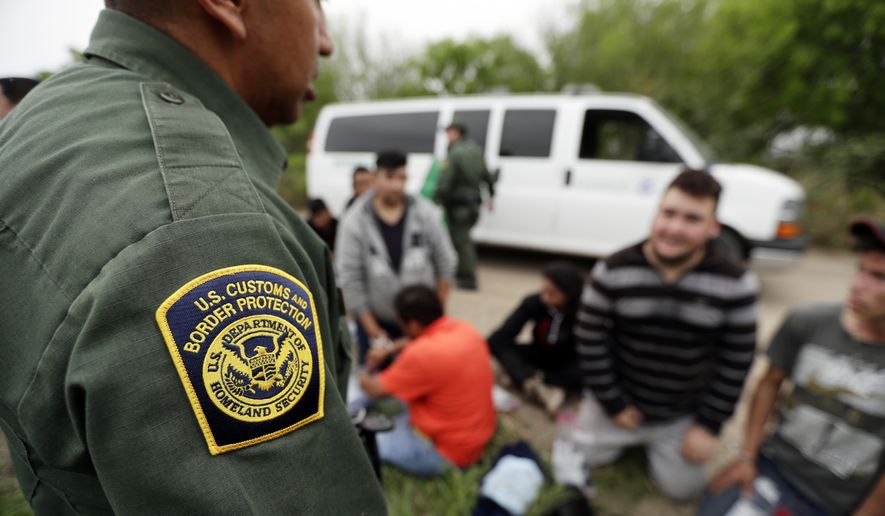Border Patrol agents now spend less than half their time on duty actually patrolling the border and are instead baby-sitting illegal immigrant children and families, a top official revealed, putting new urgency behind efforts to solve the crisis.
Sen. Lindsey Graham, South Carolina Republican, offered one solution. He proposed a bill Wednesday that would allow longer detention of migrant families, faster deportation of unaccompanied illegal immigrant children and a ban on Central Americans showing up at the U.S. border to request asylum. He said his goal was to change the incentives that spurred more than 100,000 people to breach the U.S.-Mexico line last month alone.
President Trump, meanwhile, is casting his eye even broader.
On Thursday he will outline a plan that couples new border security, including some of the same changes Mr. Graham envisions, with an even bigger overhaul of the legal immigration system, with a focus on picking immigrants based on merit. The president’s proposal will curtail family-based migration in favor of a points system that rewards those with skills that would benefit the U.S.
The Republicans’ moves come a day after Senate Democrats offered their ante on the border crisis, proposing more aid to Central America and more immigration judges in the U.S. The former move is aimed at nation-building in El Salvador, Guatemala and Honduras, hoping to change the “push” factors causing people to head north, while the judges are intended to speed up asylum cases.
Mr. Graham said sending cash to Central America is not going to cut it.
“There’s not enough money in the world that’s going to stop this,” he said.
Yet he also said Mr. Trump’s border wall isn’t enough to stop the surge, either. He said walls work to stop people trying to evade detection, which is the case for single-adult illegal immigrants and drug smugglers.
But the majority of illegal immigrants now are children and families who, because of U.S. policies, know that they will be quickly released if they are arrested.
“No matter how high the wall will be built, no matter how many drones you have, no matter how many agents you have at the border, they’ll keep coming because they want to get caught,” Mr. Graham said.
His plan calls for allowing illegal immigrant families to be detained up to 100 days. Under a judge’s ruling right now, the limit is 20 days — far too short to complete cases, which before the judge’s order lasted an average of about 45 days. Under the 20-day limit, the families are released on the often vain hope that they return later for their hearings and deportation.
More than 98% of illegal immigrant families from Central America who arrived in 2017 were still in the U.S. at the beginning of 2019. The same is true of illegal immigrant children from Central America who arrived without a parent.
Mr. Graham’s proposal would allow them to be deported faster once they are screened for abuse or trafficking. That is the same way Mexican children are treated, and the senator said U.S. law should be consistent.
He said he put his plan together by talking to people on the ground — the agents and officers who man the border, who say they have been overwhelmed by the numbers and types of people coming.
Mr. Graham got backup Wednesday from John Sanders, acting commissioner of Customs and Border Protection, who revealed that Border Patrol agents are now spending a majority of their time baby-sitting the children and families rather than patrolling the border.
“Congress must take immediate and meaningful action,” Mr. Sanders said.
One of his top aides, Border Patrol Chief Carla Provost, made that case directly to Senate Democrats last week, comparing illegal immigration to the flow of water from a faucet, and the government’s efforts to using a bucket. Chief Provost said the solution has to be a smaller flow from the faucet, not more buckets.
Democrats rejected that argument, saying they fear hindering legitimate asylum-seekers who are part of the flow of people headed north.
On Tuesday, Senate Democrats offered their bill — the same legislation they introduced in the last Congress — that would send foreign aid to Central America, increase penalties on smugglers and hire more immigration judges in the U.S.
Congress’ focus on the border makes Mr. Trump’s planned announcement Thursday all the more curious because it veers away from that issue and toward the composition of legal immigrants.
In a Rose Garden speech, Mr. Trump will call for reversing current numbers, in which about two-thirds of legal immigrant visas are doled out based on family ties. Instead, under his point system, more than half of visas will be based on merit.
Other major economies such as Canada and Australia rely on point-based systems.
Mr. Graham said Mr. Trump’s bill is “not designed to become law,” but rather to spark a debate.
Yet even as it looks toward those debates, the administration and Congress are battling over the president’s border wall and the emergency declaration he issued this year enabling the Pentagon to use defense money to build more barriers.
On Wednesday, acting Homeland Security Secretary Kevin McAleenan issued waivers of environmental laws to allow 30 miles of new construction in California and 63 miles in Arizona.
But the House Appropriations Committee’s subcommittee on defense approved a bill behind closed doors that would claw back the Pentagon money.
Democrats on the House Armed Services Committee announced legislation that would limit the president’s ability to shift money in national emergencies.
• Stephen Dinan can be reached at sdinan@washingtontimes.com.




Please read our comment policy before commenting.